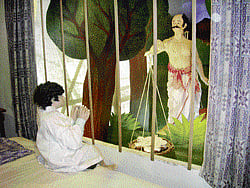Meet Amal, an immortal child character created by Tagore in ‘Dakghar’

Did you know that Rabindranath Tagore, born on May 7, 1861, was the first Nobel Laureate from Asia?
He also composed our national anthem and that of Bangladesh.
Tagore was a great poet and also wrote novels, stories and plays.
He created a number of unforgettable child characters. Amal of ‘Dakghar’ (Post Office) is one. ‘Dakghar’ has been translated and performed in many languages in India and abroad.
Amal, a little orphan boy, lives with his uncle and aunt. He has been ill for a long time. The doctor feels that the only way to cure him is to keep him shut indoors. Amal is greatly upset by this verdict. He longs to be out in the open where a squirrel sits with its tail up, picking up grains. But even this is forbidden. Amal is too gentle to protest. He looks out of the window wistfully and he dreams of the day he will grow up and go out into the world of trees, rivers, flowers, birds and sunshine. “When shall I get well?” he keeps asking.
Amal looks at the passers-by and longs to make friends with them. The first one is a curd-seller. Then comes the watchman and Amal begs him to sound his gong. “But it is not yet time,” he answers. ‘Time’ is yet another factor which puzzles little Amal. “How strange!” he remarks, “some people say that time has not yet come while others say time has gone by! Where does it go?” Amal tells him how eagerly he is waiting to visit the “land of time”.
Amal asks the watchman about the building on the other side of the road. The watchman tells him that it is the new post office belonging to the king. He says jokingly that there may be a letter for Amal some day, written by the king himself. Amal takes him seriously. He keeps longing and waiting for his letter.
The next passer-by is the nasty village headman who is unkind to all, but Amal calls out to him eagerly and asks him to tell the king’s postman to bring him his letter soon. Next comes Sudha, a flower-girl. She tells Amal how she gathers flowers and goes selling them. She also tells him about her dolls and her cat.
Amal does not think of his own suffering. He calls out to a group of boys going out to play and gives them all his own toys. He only asks them to play by his window so that he may see them. The boys also promise to tell the king’s postman about the letter he is waiting for.
Soon Amal is too ill to sit by the window. He lies in bed and waits for the old man of the village who tells him wonderful stories. He tells Amal about the island of parrots full of green hills and gleaming waterfalls washed by the sea. Amal longs to be a bird and fly there. But he cannot stop thinking of the king’s letter. He visualises the postman carrying it as he climbs down the hill, a lantern in his hand, and walks through fields of sugarcane to reach the meadow where crickets chirp and little birds sing. Amal longs to tell the king, “Please make me your messenger so that I may deliver your letters.”
Amal’s illness gets worse but he does not complain. He looks at the post office and waits patiently for his letter. Finally, the king gets to hear about Amal and sends his messenger to announce his arrival. Everyone is flustered and wonders how to receive him. But Amal only wishes to ask for his one desire when the king arrives. He is so happy that he is able to “see all the stars now twinkling from the other side of the darkness” and quietly falls asleep to awake in a land free from pain and sorrow. The summons have finally arrived for Amal. But this time it is from the king of kings.
